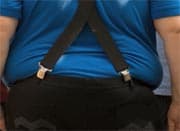Small, early study found longer 'telomeres' in genes of patients with cholesterol and inflammation problems
WebMD News from HealthDay

By Alan Mozes
HealthDay Reporter
FRIDAY, Nov. 15, 2013 (HealthDay News) -- Beyond slimming the waistlines of morbidly obese patients, weight-loss surgery also may help reverse the aging process in some patients, turning back the clock on a key sign of decline in the body's cells, a small, early study suggests.
Investigators said the finding could be an unforeseen positive side effect of invasive weight-loss (bariatric) surgery for some people with cholesterol and inflammation problems. Such surgery comes in a variety options, all designed to prompt a dramatic shedding of pounds following intestinal rerouting or a reduction in stomach size.
The upshot: One year following weight-loss surgery, some patients were found to experience a notable lengthening of the ends of their genes' tips or caps, referred to as "telomeres." The wearing down and shortening of telomeres over time has long been viewed as a genetic indicator for aging. Meanwhile, longer telomeres have been associated with health and youthfulness.
"We know that we age on a genetic level," said study co-author Dr. John Morton, chief of bariatric and minimally invasive surgery at the Stanford University School of Medicine. "It's not just about wrinkles. It's the whole system, in which our body replaces cells continuously. The more they divide over time -- or the sicker you are -- the more the ends get frayed. Like a cap on a shoelace.
"But now we found that some -- not all, but some -- obese patients who lost a lot of weight after surgery saw significant improvements in telomere length," Morton added. "This is a pretty unique finding that we haven't seen before."
Morton is scheduled to present the findings Friday at Obesity Week, the annual meeting of weight-loss surgeons and other obesity specialists, held in Atlanta.
In recent years, bariatric surgery has taken its place alongside diet and exercise as a possible intervention for those struggling to lose weight, particularly among the morbidly obese. Morbidly obese is defined as those people with a body-mass index (BMI) of at least 40. BMI is a measurement of body fat based on a ratio of height to weight.
For their current effort, Morton and his colleagues focused on 51 bariatric surgery patients, with an average BMI of about 44. On average, the patients were just shy of 49 years old, and more than three-quarters were women.
The researchers saw that by the one-year mark following surgery, patients had lost an average of 71 percent of so-called "excess" weight.
Such dramatic weight loss appeared to have a positive impact on key measures of health. For example, a year after surgery, patients' levels of C-reactive protein (CRP) -- a sign of inflammation -- had plummeted by more than 60 percent on average. Those who previously had high levels of so-called "bad" LDL cholesterol also saw their numbers drop. Meanwhile, fasting insulin levels decreased to just a quarter of what they had been pre-surgery, suggesting a lower risk for type 2 diabetes.
source : Could Weight-Loss Surgery Help Slow Aging for Some?








